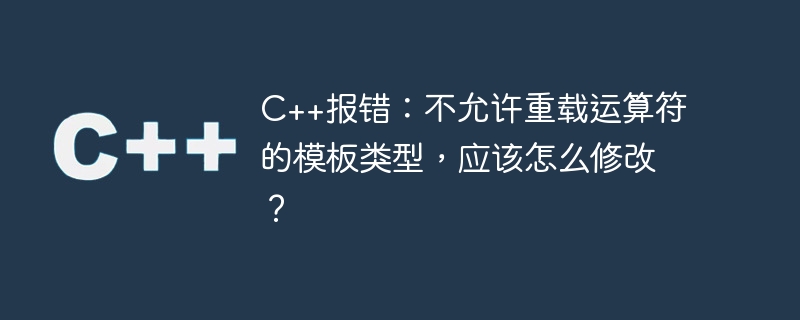

As a C programmer, we must have encountered various compilation errors. Among them, one of the more common errors is "template types that do not allow overloaded operators", which are often encountered when using template programming. In this article, we will explore the causes of this error and how to fix it.
First of all, what we need to understand is that templates in C are a way to implement universal code, which allows us to write functions and data structures that can be applied to multiple types. Operator overloading is one of the important language features in C, which allows us to customize operations between objects of different classes.
When writing a template class that supports operator overloading, sometimes we will encounter an error called "The operator cannot be overloaded on the template type". This is because C stipulates that some types cannot be operator overloaded. These include pointer types, enumeration types, function types, etc. If we treat these types as template parameter types and try to overload operators on them, this error will be triggered.
So, if we want to write a template class that can support operator overloading, how to solve this problem? There are several methods:
template<typename T>
class AddSubInt
{
public:
T operator+(const T& a, const T& b)
{
static_assert(std::is_same_v<int, T>, "Type mismatch.");
return a + b;
}
};In this way, when we try to add or subtract other types, a static assertion will be triggered, prompting that the type is incorrect. match.
template<typename T, std::enable_if_t<!std::is_pointer_v<T>, bool> = true>
T operator+(const T& a, const T& b)
{
return a + b;
}Here we use the std::enable_if_t template to determine whether the type is a pointer type, thereby eliminating Types that cannot support overloaded operators.
template<typename T>
class AddPointer
{
public:
T operator+(const T& a, const T& b)
{
// 手动实现指针加法运算
return static_cast<T>(reinterpret_cast<char*>(a)
+ reinterpret_cast<char*>(b));
}
};Although this method is a bit troublesome, it can avoid the C compiler from adding some types that cannot be overloaded. Report an error.
In short, when we write a template class that supports operator overloading, we need to pay attention to some types that cannot overload operators, and we can use the above three methods to solve this problem. By using these techniques flexibly, we can write template functions and template classes more freely, making our C code more beautiful and efficient.
The above is the detailed content of C++ error: template type that does not allow overloaded operators, how should I modify it?. For more information, please follow other related articles on the PHP Chinese website!
 mysql error 10060
mysql error 10060
 What are the methods to implement operator overloading in Go language?
What are the methods to implement operator overloading in Go language?
 What are the differences between c++ and c language
What are the differences between c++ and c language
 Recommended learning order for c++ and python
Recommended learning order for c++ and python
 Cost-effectiveness analysis of learning python and c++
Cost-effectiveness analysis of learning python and c++
 Is c language the same as c++?
Is c language the same as c++?
 Which is better to learn first, c language or c++?
Which is better to learn first, c language or c++?
 The difference and connection between c language and c++
The difference and connection between c language and c++




